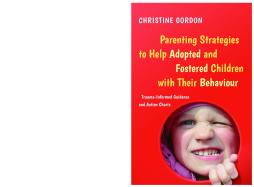
BOOK
Parenting Strategies to Help Adopted and Fostered Children with Their Behaviour
(2017)
Additional Information
Book Details
Abstract
Difficult behaviour in children with developmental trauma comes from a place of hurt. It is often confusing, unpredictable and painful both to the child and the people around them, and can be a form of self-protection or coping with deeply rooted fears and anxieties.
Traumatized children rarely respond to traditional parenting strategies, but once you understand the impact of trauma on children you can master 'developmental reparenting' strategies which do work - by validating their feelings, boosting self-esteem and encouraging open and honest conversations. The first part of this book guides you using easy to understand language through the latest science and research relating to trauma and its impact on the brain and executive functioning. The second part forms the heart of the book, laying out 35 action charts to addresses some of the very hardest challenges for parents and carers - from inappropriate sexualised behaviour and overfamiliarity with strangers through to tantrums, food issues and deception.
Written by an experienced adoptive parent who is also a qualified social worker with expertise in trauma-informed parenting, this book will be a welcome relief to any family struggling with the challenges of living with trauma in the home.
The uniqueness and innovation in this resource is in the practical nature of connecting executive functioning difficulties - the 'why does my child do this?' - to the 'what can I do?' and 'what can I say?'. Packed full of ideas, suggestions and resources for strategies and interventions, all so clearly written by Christine, this guide is not to be missed!
Edwina Grant, Chair of SAIA
This book will be of great help to adults who care for children with developmental trauma. Christine Gordon deftly helps to close the gap between understanding these children and knowing what to do to provide the consistently compassionate care they need to recover from the effects of early life trauma.
Jonathan Baylin, PhD, coauthor with Daniel Hughes of The Neurobiology of Attachment-focused Therapy
Christine Gordon is the co-founder of Family Futures adoption agency in London and founder of ADAPT Scotland, which offers parenting and therapeutic support to adoptive and foster parents caring for traumatized children.
Table of Contents
| Section Title | Page | Action | Price |
|---|---|---|---|
| Parenting Strategies to Help Adopted and Fostered Children with Their Behaviour: Trauma-Informed Guidance and Action Charts, by Christine Gordon | 5 | ||
| Preface | 13 | ||
| Introduction | 15 | ||
| Part 1 - Understanding the Behaviour and How to Help | 23 | ||
| The Impact of Early Trauma | 25 | ||
| How Neurobiological Development Affects Behaviour | 29 | ||
| Developmental Trauma and Attachment Difficulties | 31 | ||
| Developmental Reparenting | 35 | ||
| Developmental Trauma and Executive Functioning Difficulties | 41 | ||
| The Behaviour Rating of Executive Functioning (BRIEF) | 47 | ||
| Comments and Phrases that Support a Traumatized Child | 59 | ||
| Praise and Reprimands, Consequences and Rewards | 63 | ||
| Siblings | 71 | ||
| Children Who Act Out in Aggressive and Angry Behaviour | 73 | ||
| Compliant Children Who Internalize Their Feelings | 79 | ||
| Pee and Poo or Choosing Your Battles! | 83 | ||
| Part 2 - Action Charts | 87 | ||
| How to Use the Charts | 89 | ||
| Accepting Blame and Responsibility | 92 | ||
| Acting the Victim | 94 | ||
| Aggression Towards Siblings | 96 | ||
| Cheating at Games | 98 | ||
| Completing Tasks | 100 | ||
| Compliant and Helpful | 102 | ||
| Consequences | 104 | ||
| Constant Fiddling | 106 | ||
| Dangerous Behaviour | 108 | ||
| Disrupting Others | 110 | ||
| Focusing on a Task | 112 | ||
| Food Issues | 114 | ||
| Homework Issues | 116 | ||
| Hypochondriac Tendencies | 118 | ||
| Intense Sibling Rivalry | 120 | ||
| Losing Resources and Belongings | 122 | ||
| Lying | 124 | ||
| Managing Group Settings | 126 | ||
| Moving On | 128 | ||
| Peer Problems | 130 | ||
| Running Away | 132 | ||
| School and Separation Issues | 134 | ||
| Self-Harming | 136 | ||
| Sexualized Behaviour | 138 | ||
| Shouting Out | 140 | ||
| Stealing | 142 | ||
| Stranger Familiarity | 144 | ||
| Substitute Teacher/Carer | 146 | ||
| Swearing | 148 | ||
| Switching Off | 150 | ||
| Talking Constantly | 152 | ||
| Tantrums | 154 | ||
| Trouble Starting Tasks | 156 | ||
| Untidiness | 158 | ||
| Working in Silence | 160 | ||
| Blank Template | 162 | ||
| Further Resources | 165 |
